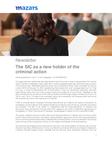
The SIC as a new holder of the criminal action
The approved text implied that two requirements had to be met in order to decentralize the criminal action; that the investigation had to deal with a certain protected legal right and that it was an action of low harmfulness. Notwithstanding the above, this constitutional reform was "corrected" by Decree number 0379 of February 16, 2012, establishing that actually this "and" corresponded to an "or"; that is to say, in order to decentralize the criminal action, it was not necessarily necessary that both requirements were met, but it was enough to prove the existence of one of them. Needless to say that, according to the provisions of the Code of Political and Municipal Regime (Article 45 of Law 4 of 1913), such "error", in order to be corrected, had to be corrected by the Congress itself and not by the Executive by virtue of the issuance of a Decree.
A Bill is currently before Congress "whereby amendments are made to the regime of protection of competition, to the functions of the Superintendence of Industry and Commerce, and other provisions are enacted". This Bill, in its article 11, establishes that the Superintendence of Industry and Commerce may exercise the criminal action with respect to the crime of Restrictive Agreements of Competition in Public Procurement Processes, contemplated in article 410 A of Law 599 of 2000.
This power, added to those currently held by the Superintendence of Industry and Commerce (SIC) and the others that it will have if the above mentioned Bill is approved, will turn this Superintendence into an omnimal and absolutist entity, endowed with sufficient powers not only to decide on the closing and continuity of the companies but also on the freedom and assets of the businessmen.
The doctrine has already pronounced itself on this risk. In its article entitled "El Ejercicio de la Acción Penal en Colombia. Reflexiones en Torno a la Reforma al Artículo 250 de la Constitución Nacional", Professor Renato Vargas Lozano indicates that the fact that other authorities (different from the Prosecutor's Office) exercise the criminal action generates a risk of "administrativization" of the criminal process in the hands of officials who may not have the dogmatic management of the administration of justice in criminal matters. It also indicates that the decongestion of the Prosecutor's Office that will be generated with this mutation of the exercise of the criminal action will be proportional to the congestion (or collapse) of the system that will be transferred to the Criminal Judge due to the claims made regarding the judicial management given by the administrative entity, in its investigation and accusation phase.
Given the aforementioned legislative background, i.e., that the constitutional reform conditions the transfer of the exercise of the criminal action to the fulfillment of two requirements ("and") and that the same was modified by the Executive by decree, and given the sensitivity of this matter, since it is about the "SIC" having the power to decide on the freedom of the persons it investigates, makes it highly inconvenient for this article to be approved because it would distort the principle of separation of powers, since an organ of the executive branch (SIC) would be usurping a power essentially proper to the judicial system, which is to decide preventively on the freedom of persons.


